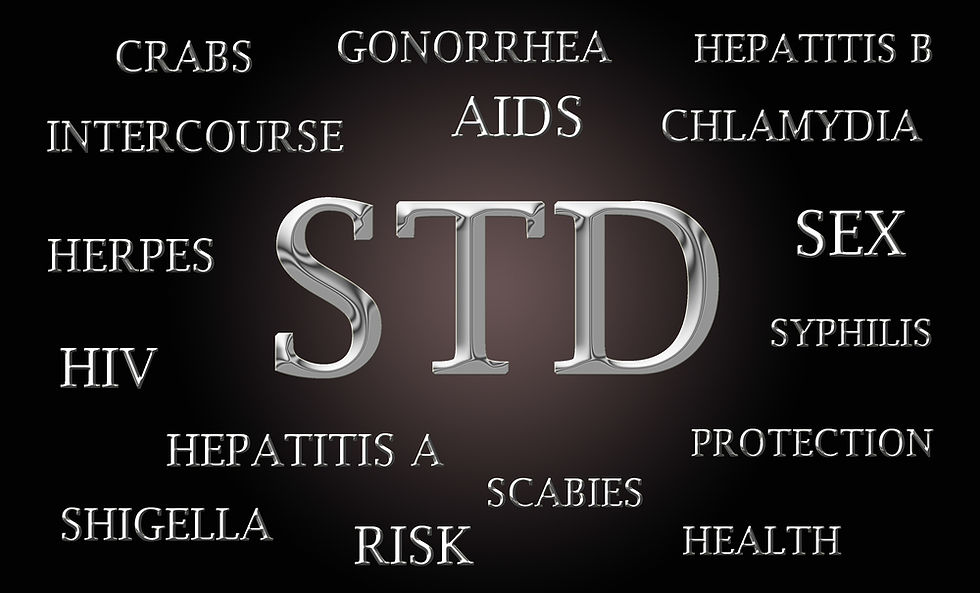The Importance of STD Testing
- Jul 8, 2020
- 4 min read
Updated: Aug 3, 2023

Although not usually taught in schools, testing for sexually transmitted infections is extremely important. There are many locations where you can get an STD test in Singapore, providing you with an abundance of options when it comes to getting tested. If you leave yourself untested, you may discover a wide range of problems in the future. These can include any of the following:
infertility
cancer
blindness
organ damage
According to estimates from national statistics, it is predicted that around 8,000 to 9,000 cases of STDs occurred in Singapore in 2018. Unfortunately, many of these individuals did not receive fast treatment for their STI’s. This is often due to the fact that many STI’s may not actually display their symptoms until the damage has been done. As a result, they are almost impossible to notice without testing. On top of this, many individuals may also feel afraid to get a test due to the stigma around testing. This can discourage them even though it is the only way for them to determine whether or not they have an STI.
When should I be tested for STIs?
If you are a sexually active individual, it is always a good idea to get tested for STI. STD screening Singapore is easily accessible and should be considered under any of the following situations:
You are about to start a new relationship
You no longer want to use condoms with your partner
You or your partner have multiple sexual partners
An individual you are having sexual relations with has had sexual relations with another person
You are displaying symptoms that may suggest you have an STI
If you are in a long-term monogamous relationship and both you and your partner were tested prior to entering the relationship, a regular STI test will not be required. However, many people in long term relationships were not tested before they got together. As a result, it is possible for one, if not both of you to carry an undiagnosed STI for years without ever noticing.
What STIs should I be tested for?
There are many STI’s that you can potentially catch from a sexual partner. In order to determine which ones you should be tested for, you should talk to your doctor or a local STI/STD Treatment clinic in Singapore. They will be able to determine which STI’s are more common in your area and may test you for any of the following:
chlamydia
gonorrhea
Ureaplasma
Mycoplasma
Genital Herpes
human immunodeficiency virus (HIV)
hepatitis B
syphilis
trichomoniasis
It is always important to ask your doctor or nurse what you have been tested for during an annual physical or sexual health checkup. Many doctors will not always test for STI’s and therefore it is important to take a proactive approach to the matter. By taking control of your sexual health, you are actually doing yourself a favor. If you are concerned regarding a particular symptom, talk to a professional. The more honest you are about your symptoms, the better treatment they can provide you with.
If you are pregnant or are looking to have a child, it is extremely important that you get screened. An STI can have a significant impact on a fetus and can cause damage to your unborn child. Your doctor should always screen for STI’s as well as other risks during your first prenatal visit.
Discuss Factors That May Put You at Risk
We understand that talking about your sexual health may feel embarrassing, however, it is extremely important to talk about your sex life with your doctor. You should tell them if you engage in anal sex, as some anal STI’s cannot be detected using regular STI testing. Your doctor may recommend additional tests from less conventional sites such as throat or anus. Cervical Pap smear test for precancerous cells, which are linked to HPV is also an important routine test that ladies should undergo regularly.
You should also talk to your doctor about any of the following:
The types of protection you are using during vaginal, oral and anal sex
Any medications that you are currently taking
Any known or previous exposures to STI’s
Whether or not you and your partner also have other partners
How are STI tests performed?
When walking into any clinic, it is always important to know what you can expect. This can help you feel comfortable when you go to visit and ensure you have the best possible experience. Based on your sexual history, your doctor may choose a number of tests in order to check for STI’s. These include urine tests, swabs, blood tests, and physical exams.
The majority of STI’s can be detected using blood or cervical or urine tests. They can be used for all of the following STI’s:
chlamydia
gonorrhea
Ureaplasma
Mycoplasma
Trichomonas
hepatitis
herpes
HIV
syphilis
In some cases, urine and blood tests are not always the most accurate form of testing due to a number of reasons. Firstly, they cannot always detect an STI from the very onset. They will often require over a month in order to become reliable. For example, if HIV has been contracted then it will take almost a month for the tests to detect any infection. If you require fast results, ask your doctor for a different type of test. They will usually have many available that can help provide you with fast results that you can act on.


